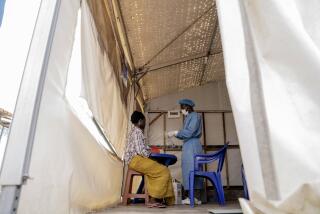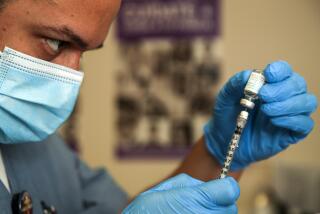U.K. reports 104 more cases of monkeypox, mostly in men

- Share via
LONDON — British health officials have detected another 104 cases of monkeypox in England in what has become the biggest outbreak beyond Africa of the normally rare disease.
The U.K.’s Health Security Agency said Monday there were now 470 cases of monkeypox across the country, with the vast majority in gay or bisexual men. Scientists warn that anyone, regardless of sexual orientation, is susceptible to catching monkeypox if they are in close, physical contact with an infected person or their clothing or bed sheets.
According to U.K. data, 99% of the cases so far have been in men and most are in London.
In May, a leading adviser to the World Health Organization said the monkeypox outbreak in Europe and beyond was likely spread by sex at two recent raves in Spain and Belgium.
Last week, the WHO said 1,285 cases of monkeypox had been reported from 28 countries where monkeypox was not known to be endemic. No deaths have been reported outside of Africa. After the U.K., the biggest numbers of cases have been reported in Spain, Germany and Canada.
The L.A. County Department of Public Health said the latest case occurred in an adult who recently traveled.
WHO said many people in the outbreak have “atypical features” of the disease which could make it more difficult for doctors to diagnose. The U.N. health agency also said while close contact can spread monkeypox, “it is not clear what role sexual bodily fluids, including semen and vaginal fluids, play in the transmission.”
Meanwhile, countries in Africa have reported more than 1,500 suspected cases, including 72 deaths in eight countries. Monkeypox is considered endemic in Central and West Africa.
More to Read
Sign up for Essential California
The most important California stories and recommendations in your inbox every morning.
You may occasionally receive promotional content from the Los Angeles Times.











